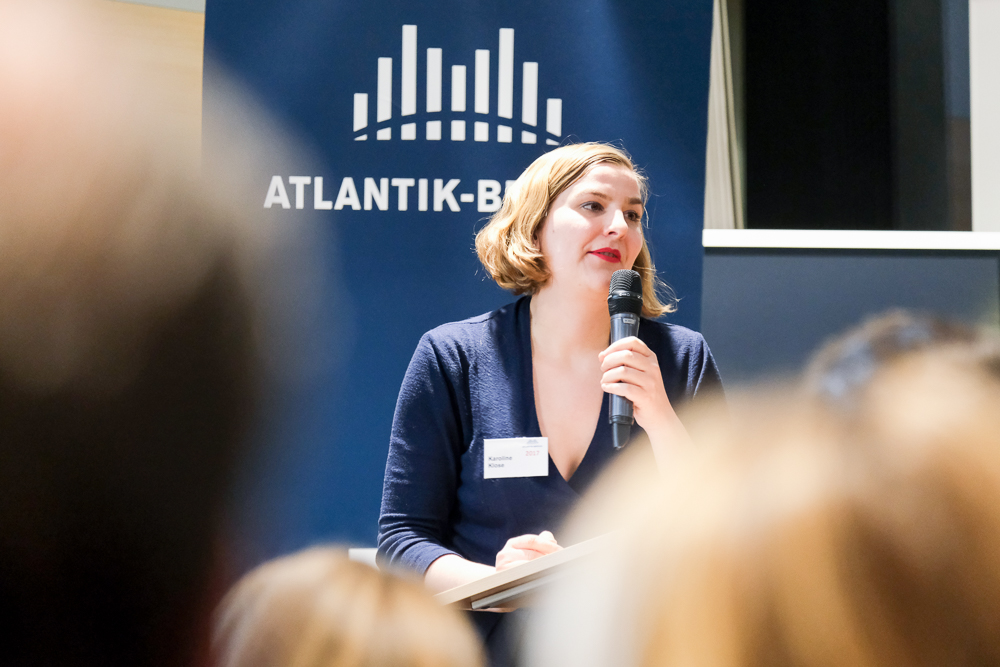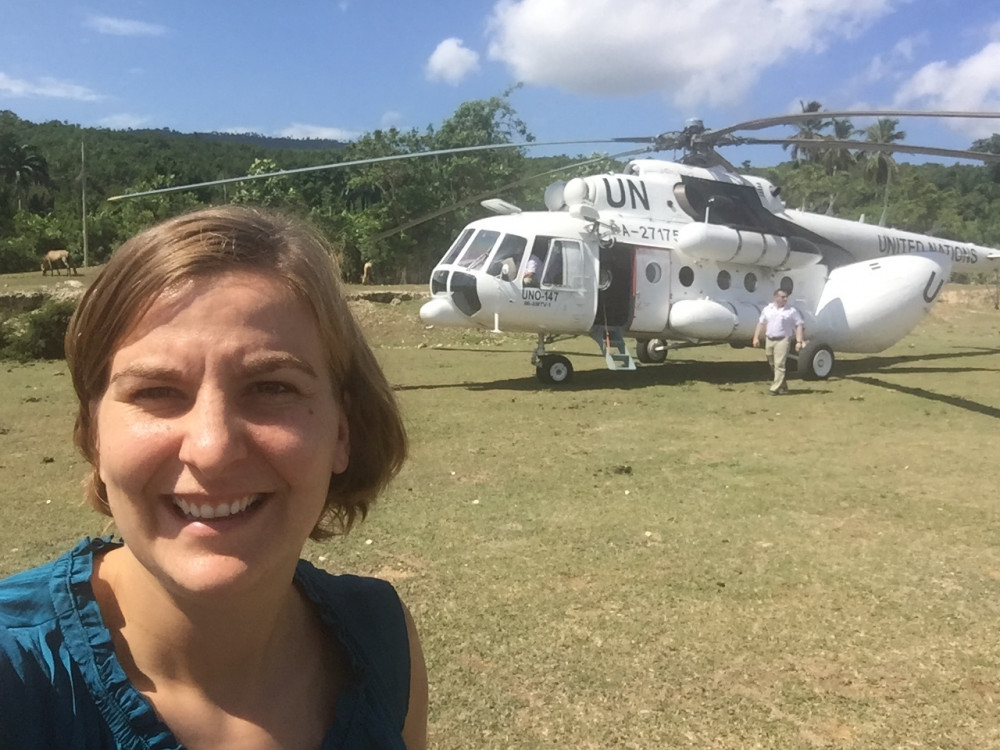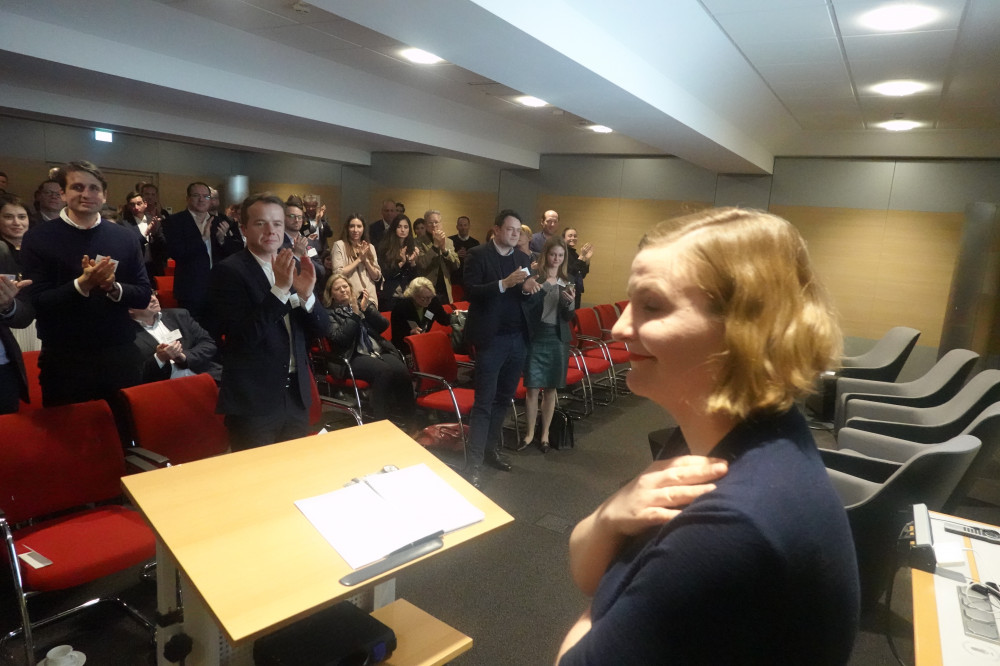The Untold Story
 Young Leaders' New Year's Reunion 2020. Foto: Atlantik-Brücke
Young Leaders' New Year's Reunion 2020. Foto: Atlantik-Brücke
Bei der Neujahrs-Reunion für die Alumni unseres Young Leaders-Programmes baten wir einige der Teilnehmer, ihre Geschichte zu erzählen – sei es über persönliches Wachstum, über eine Geschäftsidee oder über eine Begegnung, die ihr Leben beeinflusst hat. Die daraus entstandenen Reden waren sehr persönlich, bewegend und inspirierend. Der folgende Vortrag ist von Karoline Klose, ehemals bei den Vereinten Nationen (YL 2017).
Königswinter, 25. Januar 2020
The Untold Story
Good evening everyone, my name is Karoline Klose, I was a young leader in 2017 and I am excited to be here today.
It is actually funny that I am up here sharing my story. Because I was actually thinking about not coming to the reunion because I was embarrassed to show up here empty-handed, with not so much to show at the moment among all these high-flying, over-achieving leaders.
I am currently on a sabbatical; taking time out from the rat race we call life and helping build an eco-village in northern Germany (Hitzacker). When I was asked if I want to speak I thought: maybe I should do this. Maybe I should speak up for those who don’t dare to or can’t speak up. In order to change the conversation, to break the taboo and by being open and vulnerable, allow others to be open and vulnerable rather than continuing the charade saying that everything is fine while inside you are burnt out or suffering from trauma.
Here the mandatory trigger warning, I won’t be offended if you leave the room at some point.
For the next 10 minutes – I know many of you here today have different backgrounds – I want to take you on a journey into the world of the United Nations and international development, this is my very personal journey.
I can tell you two different stories: one of living the dream of working for the United Nations, saving the world, living and working in 10 different countries over the past 10 years, including Sudan, Ethiopia, Egypt, Tunisia, and a couple of others.

Here the obligatory humble brag picture every UN staff does, me in front of a UN helicopter in Haiti.
Or I can tell you the impact this kind of work had on me, something no one talked about before I started my career, or at least not in a way that would have made me listen.
So when I started, I used to feel invincible, I didn’t really pay attention to self-care workshops or online trainings. When friends or colleagues, well-meaning, said to me: “Karoline, you have to meditate, you have to do yoga to reduce the stress”, I waved them off. Thinking to myself: “I have my friends, my sports, I don’t need that.”
I had done a kidnapping/war zone training with the German military and had survived being robbed and held for several hours in Tanzania, and a nightly break-in in Sudan, all without a problem.
So when it hit me in Haiti, I didn’t know what it was, I was not warned, I did not recognize it, I didn’t know what to do.
In the beginning it was the classic psychosomatic symptoms:
- stomach cramps on the day before I had to fly back;
- almost daily outbursts of crying or anger, felling helpless, like I was not in control of my life anymore, like I had given up the power over my life to someone or an entity that was failing to keep me safe.
Then halfway through my year in Haiti my first panic attack: I was back home in Germany and just could not stop crying at the thought of having to take a plane back.
But I did get back on that plane, despite all the warning signs, I pushed myself. I did not want to risk my job, the career I had worked so hard to get. I also felt guilty: I had asked for the transfer to Haiti from New York and as a specialist for fragile states, I thought I should be able to handle this!
I finished the year but I did not extend for a second.
After that I thought I would be fine the moment I left Haiti. What I did not know is that trauma knows no time. When I was safe back home, that’s when it really kicked in and things really got started:
- First, a restless mind, racing thoughts making it impossible to sleep, especially sleep in, causing stomach upsets;
- not wanting to leave the house by myself anymore;
- no energy or will to do anything.
- Wanting to hide from people, even friends. Previously an extrovert who got energy from talking to people, I suddenly dreaded the simple question: “Hi, how are you? How are you doing?” Because, what should I answer, how should I explain how I am feeling if I don’t understand myself what is happening to me?
- Everything about Haiti agitated me, but at the same time I could not let go, still checked the security alerts on WhatsApp every day.
This was over a year ago. What has helped me since: talking to ex-colleagues and finding out that I am not alone, that others were experiencing the exact same or similar symptoms.
- A former colleague started lying fully dressed in a bathtub when she got back to her home country, the bathtub being the only place she felt safe.
- Or a male colleague with secondary trauma because he worked on Syria, unable to continue with his job and suffering from insomnia since.
Eventually I looked for help. I started therapy and got diagnosed with classic symptoms of trauma, a form of post-traumatic-stress-disorder and burnout from cumulative stress. Every session left me in tears, in emotional turmoil. But I also did not want this pain to disappear, because it was the only evidence I had. I wanted the organization to take responsibility for the damage done.
Like a carpenter who breaks his back falling off a roof while at work, unable to work on a construction site in his job anymore.
I wanted it to be recognized that this is a professional risk. We are warned that we might be bodily harmed working in crisis countries, but nobody talks about the psychological harm.
We get a medical checkup before heading out to check if we are fit to deploy, but no one checks in what state we come back, your contract and health insurance just runs out.
There is a deal you enter with the organization: “I will go anywhere you need me to go, in return: you will keep me safe.“ This deal was broken.
You are probably asking yourself what happened to me. What big traumatic event caused this.
I will have to disappoint you. I don’t have that one sensational story. Actually, what happened to me is not that important, it is very subjective, it is more about how we experience things.
I blamed myself a lot, thought it was my fault that I could not handle it. I felt very alone with everything. But what helped was finding people who had had similar experiences, whether it was firsthand trauma or secondary trauma from doing interviews with refugees or handling disturbing content.
The worst that you can do when someone comes to you with something like this, wanting to share is to keep silent. Just say something, anything is better than silence, so they feel heard and understood.
So what caused my trauma?
- Was it the daily fear of being robbed at gunpoint?
- Or the question whether I should take the dog of my housemate for a run, but then deciding against it because in case I got robbed or kidnapped, they probably would shoot the dog first, so I went alone.
- Or the headlights in my rear window at night of a motorbike following me, me being afraid whether they were going to rob me at the next corner.
- Or a colleague getting killed in a robbery coming from the airport, shortly after I had left.
- Or was it the hatred of the local population against foreigners, especially the UN? A single stone thrown, smashing the window, showing you that a car is no protection at all.
- Or maybe the shots at night in the neighborhood?
- Or the dead body lying in the middle of the road during rush hour – half undressed, eyes open, bloated, flies circling – and not being able to talk to anyone about it since apparently this is normal and I should toughen up.
- Or the lack of freedom of movement? But then again, friends working in Iraq or Afghanistan seem to be better protected, better taken care of.
I don’t know what it was and I don’t want to create fear. I would probably choose this career again. I just want to break down the taboo that we can openly talk about trauma, not only of soldiers. And support each other and reach out and have an open ear and heart.
Even if you are not in the world of international organizations and development, it does not have to be a war zone but it can be a job or environment that is not good for you: get help and just don’t stay too long.
Thank you for listening to me.

Karoline Klose, founder of Trauma Talk UN
For more information: www.traumatalk-un.org
To contact the author: talk@traumatalk-un.org
